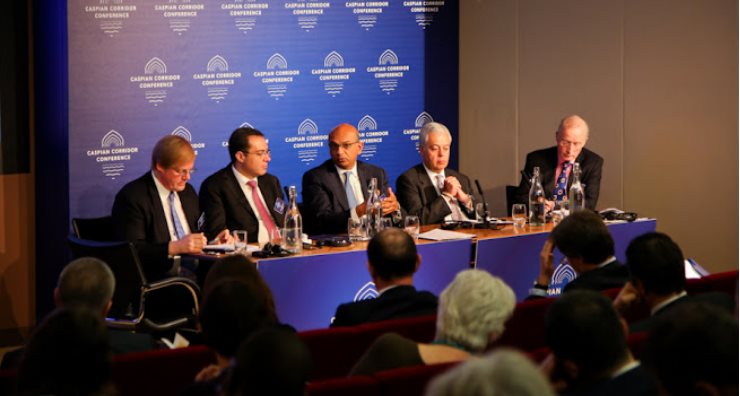Driving commercial and political engagement between Asia, the Middle East and Europe
Driving commercial and political engagement between Asia, the Middle East and Europe
Driving commercial and political engagement between Asia, the Middle East and Europe

The oil-rich country of Azerbaijan is aiming to move away from reliance on mining and hydrocarbon industries in a bid to diversify its economy.
Speaking at the Caspian Corridor Conference, hosted by the London Stock Exchange in March 2014, Shahmar Movsumov, executive director of The State Oil Fund of the Republic of Azerbaijan (SOFAZ), said that poverty in Azerbaijan had dropped from 49 per cent to six per cent, GDP growth had tripled in the last three years and inflation was stable.
“The economy is diversifying and all these developments show that there is huge potential for the region. It is becoming a more integrated region and a new market,” he added.
But he said he was acutely aware of the challenges of managing wealth from oil and gas.
“If you look across the world there are so many examples of failed states that had large amounts of oil and natural resources. It is imperative to develop at a slower pace. On the one hand it’s a great thing to have a lot of natural resources but it’s equally a huge challenge to manage them properly,” he told delegates.
He said one of the core objectives of SOFAZ was to avoid what can go wrong in an oil-rich economy, and instead enhance Azerbaijan’s socio-economic progress, preserve macro-economic stability and protect and conserve Azerbaijan’s wealth.
The State Oil Fund is a purpose-built state-run organisation that collects, invests and manages Azerbaijan’s revenues from oil and gas agreements. Its aim is to ensure the wealth reaches all sections of society and money is used to drive economic diversification and develop non-oil and gas industries in Azerbaijan. The executive director of SOFAZ is appointed by the President of the Republic of Azerbaijan.
“SOFAZ is managing 50 per cent of Azerbaijan’s GDP, that is almost half the state budget of Azerbaijan,” Movsumov said. “If that money was invested internationally it would lead to major imbalances. Current generations have huge needs. We need to invest more to create the potential for the growth of the economy, ” he said.
“There have been discussions about how to use the money. Some would create big factories and plants and jobs for people but some have said ‘Don’t do that because governments make bad business people.’ Invest in infrastructure and let the private sector create jobs instead. Agriculture is important but we don’t believe it can lead growth in this country. Most countries support and subsidise it to lead to growth. It is better to focus on technology,” he said.
That is what SOFAZ is doing. One of the major projects that SOFAZ is investing in the construction of the TANAP (Trans Anatolian gas pipeline), which is one of the pipelines that will transport Azerbaijani gas to Europe for the first time. SOFAZ has so far invested US$15 billion in the Shah Deniz Stage 2 project. The project and its pipelines are estimated to cost US$50 billion in total and will bring more than 16 billion cubic metres of gas a year to markets. The first gas from the Shah Deniz gas field in Azerbaijan is expected to reach Europe in 2019.
There were concerns expressed in the audience as to whether enough fresh funding was available to fund the project especially now that Iran, which has the second largest oil reserves in the world, was ‘coming out of the cold.’ But Vahid Alaghband, founder and Chairman of Balli Holdings Ltd, said that since corporate governance was good in Azerbaijan, it would find it easier to attract capital than Iran right now.
naomi.canton@asiahouse.co.uk
To read about a major deal that was struck at the March 2014 Caspian Corridor Conference click here.
To understand more about how the Southern Gas Corridor will revolutionise energy markets in Europe, click here.
